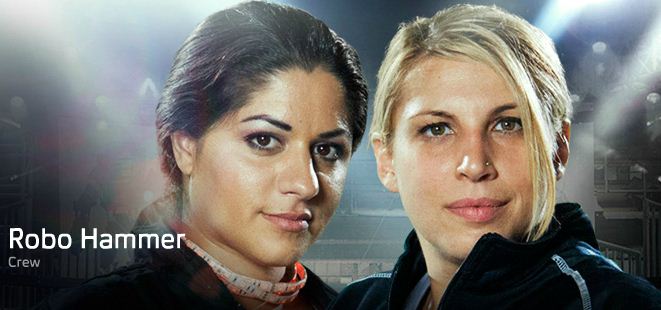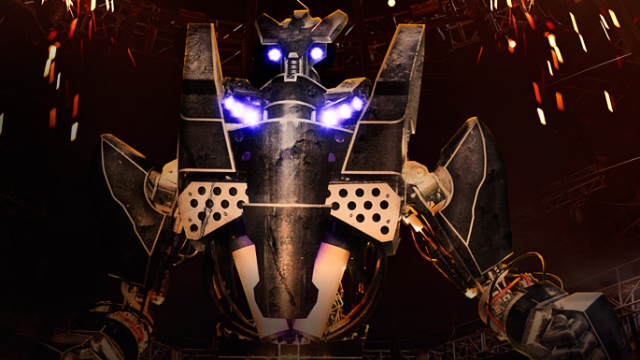‘Robot Combat League’ Stars Calit2’s Saura Naderi in ‘Fight to the Death’
By:
- Tiffany Fox
Published Date
By:
- Tiffany Fox
Share This:
Article Content

Calit2 Outreach Coordinator Saura Naderi (left) and mixed martial arts fighter Amanda Lucas combine their talents to control Robo Hammer, one of the robot fighters in SyFy's "Robot Combat League."
A new television series featuring 12 giant robots who ‘fight to the death’ casts University of California, San Diego engineering physics and Warren College alumna Saura Naderi (B.S., '07) as one of a dozen ‘robo-techs’ who partner with a human fighter (‘robo-jockey’) and a super-sized robot to compete for a $100,000 prize.
Naderi features prominently in next week's episode of "Robot Combat League," which airs every Tuesday at 10 p.m. ET/PT on the Syfy network. The series bills itself as the “next generation of arena combat” and is hosted by World Wrestling Entertainment’s Chris Jericho. Each episode features tournament-style battles between 8-foot-tall humanoid robots, which the robo-techs and robo-jockeys control using a high-tech exoskeleton suit that translates their exact movements to the robots.
Naderi, who is the outreach coordinator for the UC San Diego division of the California Institute for Telecommunications and Information Technology (Calit2) and directs the Calit2 myLab Program, calls the experience “awesome.”
“Our objective was to destroy these beautiful eight-foot robots — how often do you get permission to do that?” asks Naderi, who is also outreach coordinator for the National Science Foundation-funded Variability Expedition at UCSD. “These robots are made to fight, to be destroyed. Watching them fight, you realize what actually happens when two giant machines try to destroy each other. It’s like a car crash.”
The robots of Robot Combat League were designed and created by robotics expert, Mark Setrakian (of “Hellboy” and “Men in Black”). Naderi’s robot, Robo Hammer, was built for speed using reclaimed parts from top-of-the-line vehicles. A variety of exposed hoses and non-vital mechanical parts on the body armor lessen the impact of opposing robot hits without allowing damage to internal structures. The lightweight body armor on Robo Hammer lets the robot move freely and deliver lightning-fast punches, but also makes the robot vulnerable to attacks.

Naderi's robot, Robo Hammer, was built for speed using reclaimed parts from top-of-the-line vehicles. Naderi says that her experience working at Calit2 helped her communicate basic engineering skills to her partner when her robot was experiencing technical difficulties.
“Every fight we did with the robots was so expensive,” adds Naderi, whose Twitter handle, even before her TV debut, was @Robotsaura. “One fight alone would have funded half a year of my outreach activities, and maybe more. I hope people realize that when they watch this show. These are not trivial fights.”
Naderi partnered on the show with professional mixed martial arts fighter Amanda Lucas (daughter of Star Wars director/producer George Lucas) to operate Robo Hammer. Lucas controlled the robot's combat movements by wearing the exo suit, while Naderi used a joystick to control speed and direction.
Naderi says her experience working at Calit2 “gave me the ability to communicate engineering to non-engineers. I’d pull Amanda aside and teach her some basic electronics.” Naderi also made sure to visit the UCSD Machine Shop and requested welding lessons before taping of the show began.
Much of her work for the Calit2 myLab focuses on teaching young girls about fundamental engineering concepts, such as using Arduinos and other microcontrollers to construct robotic hats.
“The objective of myLab is to be the first stop for exploring electronics,” she explains. “Unlike on the set of Robot Combat League, we don’t have a lot of expensive equipment, so our students really can’t damage anything. I even encourage people to make mistakes and break things to understand the limits of what they’re trying to learn — as long as it’s under 10 dollars!”
Naderi says she hopes to parlay her debut small-screen performance into a television program of her own as “the Martha Stewart of electronic crafts.”
“I love learning how things work,” she adds, “and I like to be able to manipulate things and build them from scratch. I guess I’m always curious. It never ends.”
Share This:
You May Also Like
Engineers Take a Closer Look at How a Plant Virus Primes the Immune System to Fight Cancer
Technology & EngineeringStay in the Know
Keep up with all the latest from UC San Diego. Subscribe to the newsletter today.



